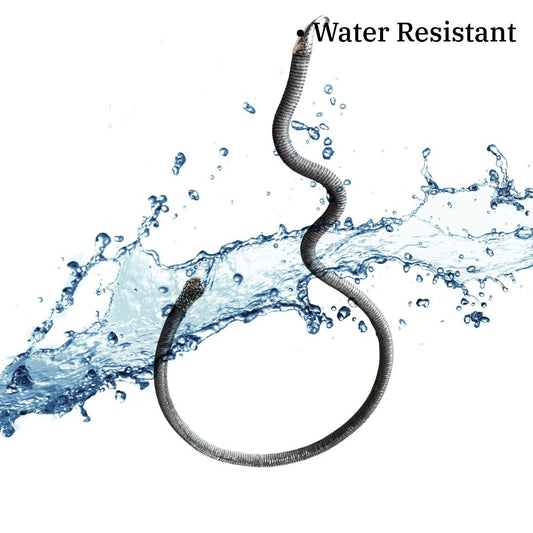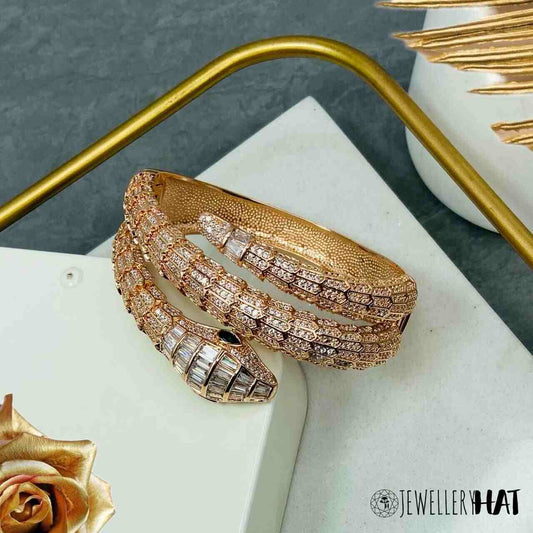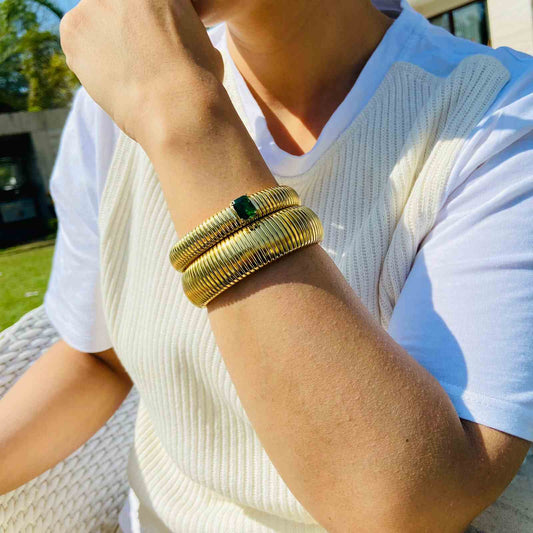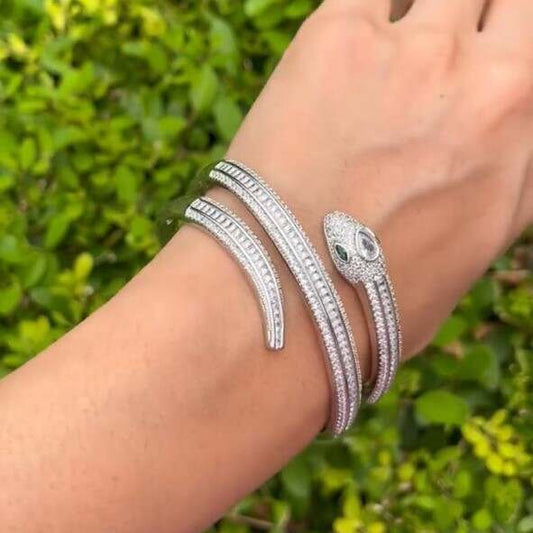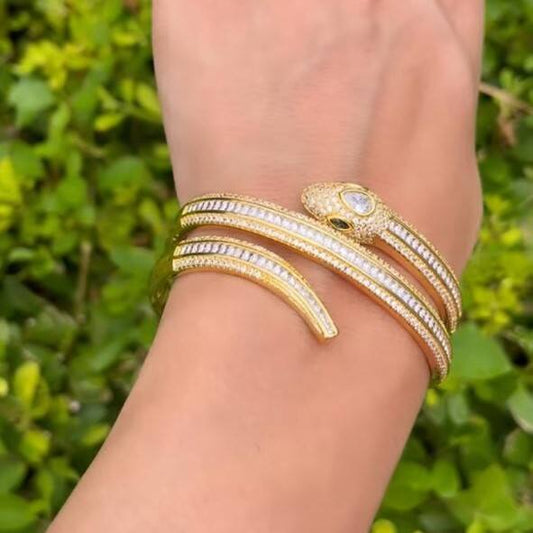When choosing jewelry, one of the essential considerations is its impact on your health. A common question people ask is, "Is stainless steel OK for health?" At Jewellery Hat, the fastest-growing fashion jewelry brand in India, we offer a broad range of stainless steel jewelry, including earrings, necklaces, bracelets, and rings. All our pieces are anti-tarnish and come with a lifetime replacement warranty on polishing*. In this comprehensive guide, we will delve into whether stainless steel is OK for health, why it is a popular choice, and how Jewellery Hat’s stainless steel pieces stand out.
What is Stainless Steel?
To determine if stainless steel is OK for health, it's crucial to understand what stainless steel is and how it differs from other materials. Stainless steel is an alloy primarily composed of iron, carbon, and chromium. This unique combination provides stainless steel with certain properties that make it both durable and health-friendly.
Composition of Stainless Steel
- Iron: The primary metal in stainless steel, serving as the base of the alloy.
- Carbon: Adds strength and hardness to the alloy.
- Chromium: Constitutes at least 10.5% of the alloy. Chromium reacts with oxygen to form a protective layer of chromium oxide, which helps prevent rust and corrosion.
- Nickel: Often included to enhance corrosion resistance and improve the alloy’s appearance.
Types of Stainless Steel Used in Jewelry
- Grade 316L: This is the most common grade used in jewelry due to its high resistance to rust and corrosion. It also has hypoallergenic properties, making it suitable for people with sensitive skin.
Is Stainless Steel OK for Health?
The short answer is yes, stainless steel is generally considered safe for health. Here’s why stainless steel is OK for health, especially when using high-quality grades like 316L:
1. Hypoallergenic Properties
- Nickel Content: One of the primary concerns with metal allergies is nickel. Stainless steel, particularly grade 316L, contains a lower percentage of nickel compared to other alloys. This makes it less likely to cause allergic reactions or skin irritation.
- Skin Compatibility: Many people with sensitive skin find stainless steel jewelry to be a comfortable and safe option. The low nickel content and the protective chromium layer contribute to its hypoallergenic nature.
2. Non-Reactive Nature
- Corrosion Resistance: Stainless steel is highly resistant to rust and corrosion due to its chromium content. This non-reactive quality means that it does not release harmful particles into the skin, making it a safe choice for everyday wear.
- Chemical Stability: Unlike some other metals, stainless steel does not react with most chemicals, including those found in skincare products or detergents. This further reduces the risk of skin irritation.
3. Medical and Industrial Use
- Medical Applications: Stainless steel is widely used in medical devices such as surgical instruments and implants. The material’s biocompatibility and resistance to rust and corrosion make it suitable for prolonged contact with the human body.
- Industrial Use: The same properties that make stainless steel suitable for medical use also apply to its use in various industrial applications. Its durability and resistance to harsh conditions demonstrate its safety and effectiveness.
Comparing Stainless Steel to Other Jewelry Materials
To understand why stainless steel is a healthy choice for jewelry, let’s compare it to other materials commonly used in jewelry.
1. Stainless Steel vs. Silver
- Nickel Content: Silver, especially sterling silver, often contains additional metals like copper and sometimes nickel, which can cause allergic reactions in some individuals. Stainless steel, particularly grade 316L, has a lower nickel content, making it less likely to cause skin issues.
- Maintenance: Silver jewelry can tarnish and require regular polishing, which might involve exposure to chemicals. Stainless steel does not tarnish and is easier to maintain, reducing the need for chemical treatments.
2. Stainless Steel vs. Gold
- Gold Alloys: Some gold alloys used in jewelry can contain nickel or other metals that may cause allergic reactions. While gold itself is less likely to cause allergies, the alloys used can sometimes trigger sensitivities. Stainless steel’s lower nickel content makes it a better option for those with metal allergies.
- Durability: Stainless steel is more durable and resistant to scratches compared to gold. This durability means that it is less likely to break down and potentially cause skin irritation over time.
3. Stainless Steel vs. Titanium
- Hypoallergenic Properties: Titanium is known for its hypoallergenic qualities, much like stainless steel. Both materials are highly resistant to corrosion and suitable for sensitive skin.
- Cost and Practicality: Titanium is generally more expensive than stainless steel. Stainless steel provides similar benefits at a more affordable price, making it a practical choice for high-quality, hypoallergenic jewelry.
Why Jewellery Hat’s Stainless Steel Jewelry is a Top Choice
At Jewellery Hat, we specialize in stainless steel jewelry that combines style, durability, and health benefits. Here’s why our stainless steel pieces are an excellent choice:
1. Extensive Range of Designs
We offer a wide variety of stainless steel jewelry to suit different styles and preferences:
- Earrings: From classic studs to modern hoops, our stainless steel earrings are designed to be both stylish and comfortable.
- Necklaces: Our collection includes delicate chains and bold statement pieces, all crafted with care to ensure they are gentle on your skin.
- Bracelets: Explore sleek bangles and fashionable cuffs that provide elegance and durability.
- Rings: Our stainless steel rings range from minimalist designs to intricate patterns, offering beauty and strength.
2. Anti-Tarnish and Low Maintenance
Our stainless steel jewelry is designed to stay tarnish-free and easy to care for:
- High-Quality Alloy: We use premium grade 316L stainless steel, known for its high resistance to rust and corrosion.
- Easy Care: Stainless steel requires minimal maintenance. Regular wiping with a soft cloth and occasional washing with mild soap and water is usually sufficient.
3. Lifetime Replacement Warranty on Polishing
We are committed to the quality of our stainless steel jewelry with a lifetime replacement warranty on polishing*:
- Ongoing Care: If your jewelry needs polishing, we offer a lifetime replacement warranty to ensure it remains in top condition.
- Commitment to Quality: This warranty reflects our dedication to exceptional service and maintaining the beauty of your stainless steel jewelry.
4. Health-Conscious Design
Our stainless steel jewelry is designed with health in mind:
- Hypoallergenic Properties: Our use of grade 316L stainless steel ensures that our jewelry is gentle on sensitive skin and less likely to cause allergic reactions.
- Safe and Durable: The material’s resistance to rust and corrosion contributes to its safety and longevity, making it a reliable choice for daily wear.
How to Care for Your Stainless Steel Jewelry
Proper care helps maintain the appearance and longevity of your stainless steel jewelry. Here are some tips:
1. Regular Cleaning
- Routine Wipe: Use a soft cloth to remove dust and fingerprints regularly. This helps keep the surface of your jewelry clean and shiny.
- Occasional Washing: For a deeper clean, wash your jewelry with mild soap and water. Avoid using harsh chemicals or abrasive cleaners that could damage the finish.
2. Avoid Contact with Chemicals
- Protect from Harsh Substances: Keep your jewelry away from perfumes, lotions, and cleaning products to avoid potential reactions or buildup.
- Remove During Activities: Take off your jewelry when swimming or engaging in activities that may expose it to chlorine or saltwater.
3. Proper Storage
- Store Safely: Keep your stainless steel jewelry in a cool, dry place, preferably in a soft pouch or jewelry box to prevent scratches and tarnishing.
- Separate Pieces: Store each piece separately to avoid contact with other jewelry, which can cause scratches.
Common Myths About Stainless Steel Jewelry
1. Stainless Steel Jewelry is Toxic
- Fact: Stainless steel is not toxic. The chromium and nickel used in stainless steel are present in low amounts and are generally safe for most people. The material’s hypoallergenic properties further ensure its safety.
2. Stainless Steel Jewelry Causes Allergies
- Fact: Stainless steel, particularly grade 316L, is designed to be hypoallergenic. Its low nickel content and protective chromium layer make it less likely to cause allergic reactions compared to other metals.
3. Stainless Steel Jewelry is Not Stylish
- Fact: Stainless steel jewelry is available in a wide range of stylish designs and finishes. It offers a modern, sleek look that can be both elegant and versatile.
Conclusion
In conclusion, stainless steel is generally considered OK for health due to its hypoallergenic properties, non-reactive nature, and widespread use in medical and industrial applications. At Jewellery Hat, we offer a wide range of stainless steel jewelry that combines style, durability, and health benefits.
Explore our collection of stainless steel earrings, necklaces, bracelets, and rings to find the perfect addition to your jewelry collection. With our anti-tarnish technology and lifetime replacement warranty on polishing*, you can enjoy high-quality, elegant jewelry that is both beautiful and health-conscious. Discover why Jewellery Hat is India’s fastest-growing fashion jewelry brand and choose stainless steel jewelry that meets your style and practical needs.
Contact Us :-













